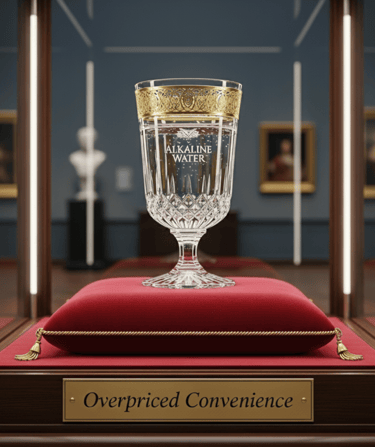Alkaline Water Hype vs. Your Wallet: The $900 Bubble


“Alkaline” bottles promise to rebalance your body, de-age your cells, and out-zen your yoga mat. Cute. But here’s the splash of reality: your body already has a pH control system with the efficiency of a Swiss train
Science in 60 seconds: Your stomach is very acidic (pH ~1.5–3.5). When alkaline water hits that acid, it gets neutralized. Any tiny pH nudge that escapes the stomach gets snapped back by your kidneys—because your blood pH doesn’t mess around. In plain English: expensive “pH water” becomes… regular water. Harvard Health puts it bluntly: raising stomach pH with alkaline water is temporary, and the body rebalances quickly. Translation: No body “alkalizing,” no magic.
But don’t some studies say…? Great question. Let’s zoom out to reviews that lump the evidence together—because one small, quirky study is how wellness myths are born. A 2016 systematic review in BMJ Open looked at alkaline diets and alkaline water for cancer prevention or treatment and concluded there’s no good evidence to support the claims. The authors’ bottom line: promoting alkaline water for cancer is not justified.
Newer review, same story. A 2024 systematic review in Reviews on Environmental Health compared alkaline/oxygenated/demineralized waters with standard mineral water in healthy people. Result: no meaningful differences on gut microbiota, urine pH, blood measures, fitness, or other outcomes. Recent evidence doesn’t prove additional health effects compared with plain old mineral water. In other words: you’re paying for a vibe.
The $ math: If you buy one $2.50 bottle of alkaline water a day, that’s about $910.50 a year. For water. Meanwhile, tap water in most U.S. cities costs pennies per gallon. Toss in a decent carbon pitcher filter (~$30 - $50 per year for cartridges) if you prefer the taste or want to reduce chlorine and off-flavors. You’ll still be hundreds of dollars ahead - with roughly the same hydration outcome.
“But my friend swears by it!” Placebo is powerful - rituals make us feel better. Also, when people start an “alkaline water” phase, they often drink more water (good), sleep a little more (also good), and carry a fancy bottle (neutral, but stylish). The feel-good part is real; the pH part is marketing.
What alkaline water can’t do:
1. Detox you: Your liver and kidneys do that. Hydration helps, but pH branding doesn’t turbocharge the process.
2. Change your body’s pH: Not beyond tiny, fleeting shifts which your body quickly corrects.
3. Prevent/treat cancer: That’s not a thing supported by evidence.
4. Outperform plain water for health metrics: Recent reviews don’t show superior outcomes in healthy folks.
Smart swaps that actually save money (and maybe help health):
1. Tap + filter > bottled “alkaline.” If your local water report is solid, a pitcher or faucet filter nails taste and odor for far less cash
2. Electrolytes only when needed. Training hard in heat? Add a pinch of salt or a legit electrolyte mix. Lounge-level activity? Plain water is fine.
3. Hydration habits > hydration hype. Keep a reusable bottle in sight. Sip to thirst. Eat water-rich foods (fruit, veggies). Your kidneys will send thank-you notes in urine color.
If you have diagnosed reflux, a small subset of people report symptom relief with lower-acid beverages. But even there, quick fixes (antacids) or guideline-based therapies work better than chasing pricey pH water—again, any effect from alkaline water is transient, and reflux is more about backflow than global “acidity.”
Red flags in the wild: “Micro-clustered water,” “structured hexagonal water,” “negative ORP miracles,” or claims that food turns your blood alkaline. When jargon stacks higher than the evidence, it’s usually marketing scaffolding.
Your tidy takeaway:
A respected medical source says alkaline water’s pH advantage gets neutralized in the stomach and quickly corrected by the kidneys.
Two independent reviews - one on disease claims (cancer) and one on healthy people - find no convincing health edge over regular water.
Therefore, the premium you’re paying is for packaging and promises, not proven physiology.
Skip the $2.50 bottle, pocket roughly $900 a year, and let your body’s pH system keep doing the free, boring, beautiful job it’s always done. Hydrate because you’re thirsty, not because your water claims to be spiritually elevated.
